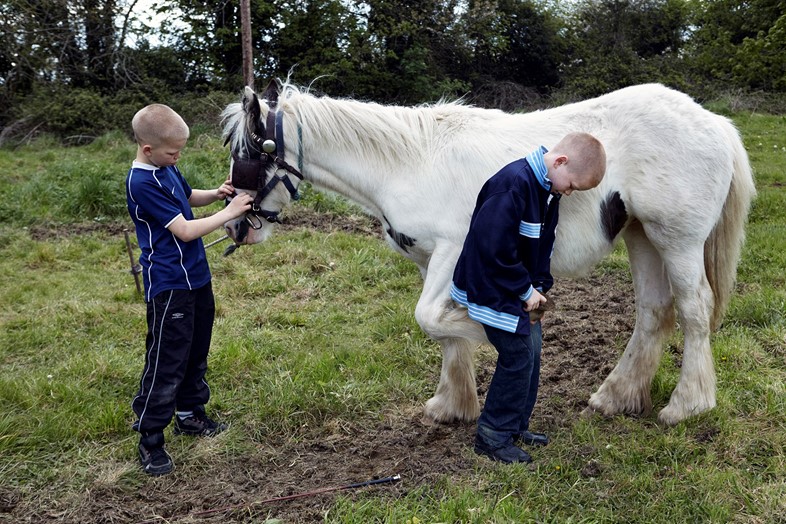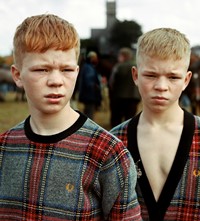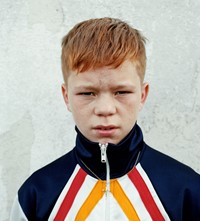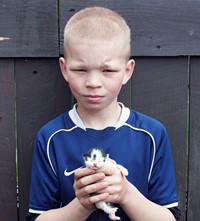Photographer Perry Ogden presents his new book, Paddy & Liam, and discusses the challenges facing Travellers in 2018
- TextTed Stansfield
Perry Ogden is the photographer best known for his 1999 book Pony Kids – a stunning documentation of Ireland’s suburban ‘horse culture’ during the 1990s. It features beautiful portraits of children – many of whom were Travellers – and the horses they owned and rode around the outskirts of Dublin. Now incredibly rare, Pony Kids was named by Sarah Burton as a key inspiration behind her A/W18 menswear collection for Alexander McQueen, while Kent & Curwen’s Daniel Kearns also referenced the book, even enlisting the photographer to shoot his new collection as part of a special collaboration.
Now, nearly 20 years since Pony Kids’ publication, Ogden is releasing a new and not entirely unrelated book entitled Paddy & Liam. Published by IDEA, this book is the result of a collaboration with stylist Tara St Hill and focusses on two extraordinary-looking Traveller brothers called Paddy and Liam Doran – who, incidentally, he shot as part of the Kent & Curwen project. Ogden has known the Dorans for a long time and this book reflects that, featuring images from throughout their childhood, as well as more recent ones styled by St Hill.
Ahead of Paddy & Liam’s launch at DSM London on Thursday, Ogden tells us more about these brothers and discusses the challenges facing Travellers in 2018.
How did you come across Paddy and Liam?
I’ve known them for a long time actually. My former partner, Marina, met their father who was a squeezebox player. They were looking for a place to live and she let them park their caravan on her land – in her garden as such. They lived there for many years while they were trying to get housed.
What did you find interesting about them, photographically?
They were so striking. If you look at those early pictures, they are amazing looking. It started out as one photo story and I came back to them a couple of years later and then came back to them again for this book.
What is their response to having a book made about them?
They’re excited. It’s been an interesting journey for them. They’ve been very trusting in me.
When you were doing Pony Kids, Travellers were facing a lot of challenges, particularly from the council. What kind of challenges are they facing now?
I think they’ve always been despised and discriminated against by mainstream society, so nothing has changed there. Even a Traveller family moving onto a council estate can get a lot of stick from their neighbours, because people make assumptions… Like, “Okay, that means criminality, that means trouble” et cetera. I think very little has changed for them since Pony Kids.

Where does your interest in Travellers stem from?
I think I’ve always been interested in outsider culture and they are outsiders. I’ve been fascinated by them since I first came to Ireland in the mid-80s. They live in an older style; it’s a slightly more primitive way of life. It’s interesting to see how that works.
What are some of the cultural differences are between Travellers and people in mainstream society?
I guess there’s a sense that Travellers are freer. They haven’t signed up to the same cultural mores as us. It’s always interesting with Traveller kids, the kind of questions that they ask – a lot of settler kids would never ask those questions because they have already been told off for being too nosy. There’s a tiny bit of wildness there that is kind of fascinating.
What kind of things would they ask?
Winnie, from my film Pavee Lackeen (The Traveller Girl) would ask questions about my former partner and I – “Why did you break up, why did you do this, why did you do that” and she was just a 10 or 11-year-old girl. I don’t think other children would necessarily ask those kind of questions. There are moral codes of behaviour that become embedded in us so-called “well-educated” people. But when you live outside that society, you don’t have those codes instilled into you. In a sense you’re a freer person.
What do you hope people will take away from the book?
I think that it’s always interesting to expose people to a culture that they’re not familiar with. In the case of Paddy & Liam, I want people to get a sense of what it is to be a Traveller kid, where that overlaps with being a settled kid and where the cultures meet.
Paddy & Liam is available from Thursday, published by IDEA.















